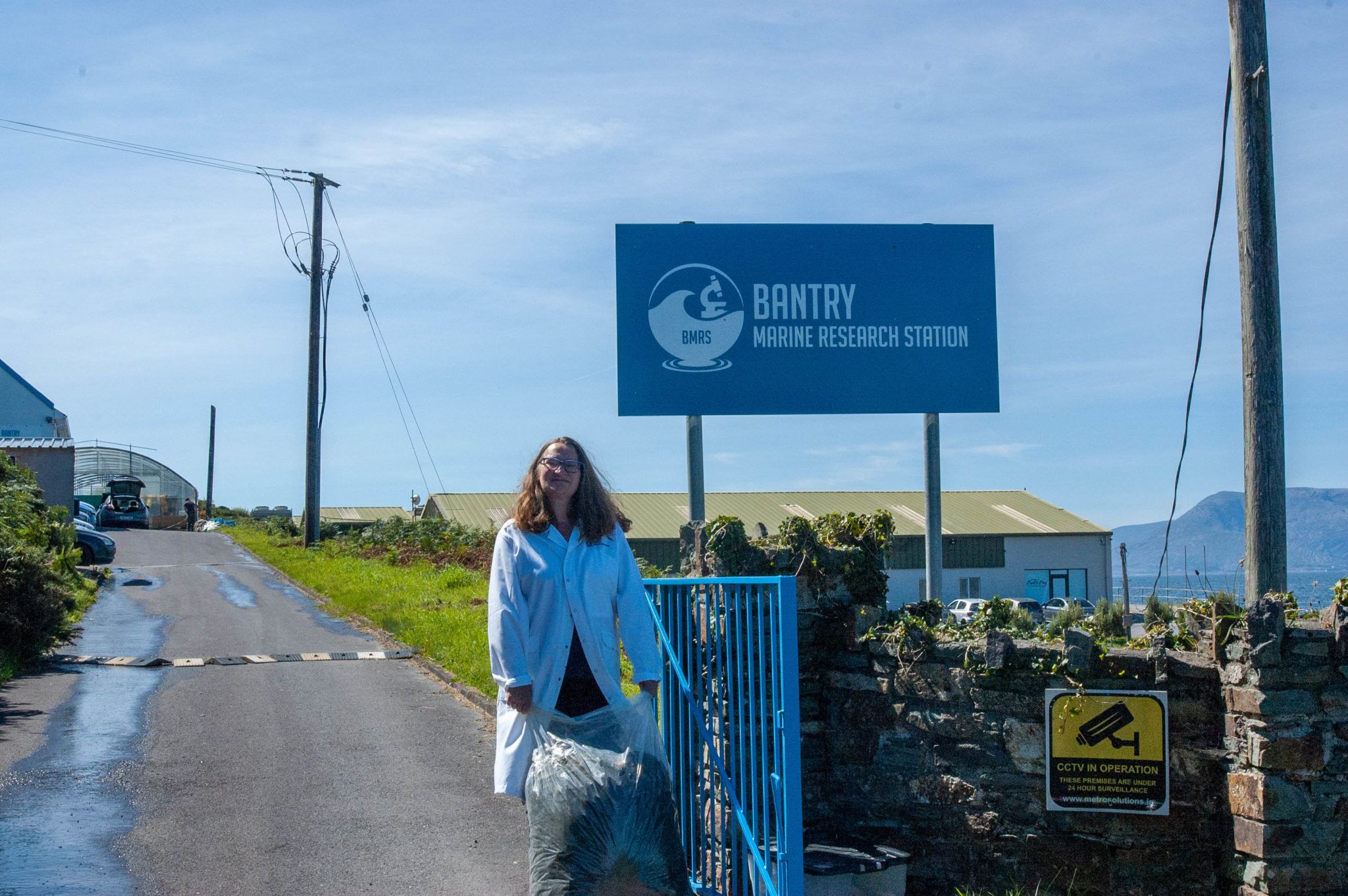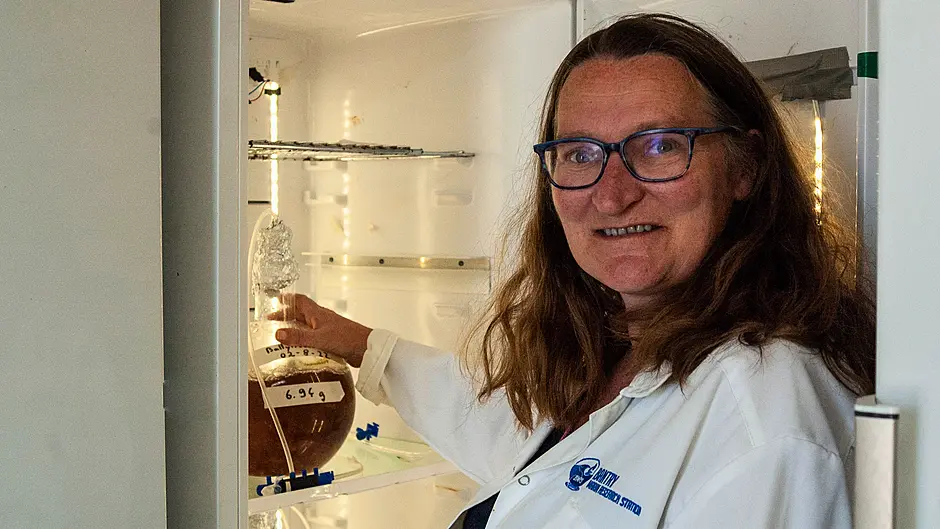Research in Bantry Bay could result in a reduction in methane from cattle by an incredible 99%. But the government isn’t funding such ground-breaking work, despite expecting farmers to cut emissions by 25%
A WEST Cork marine research company has made a major breakthrough in its work to grow seaweed, that could be the key to reducing the carbon footprint on Irish farms.
Based on the shoreline overlooking Bantry Bay, Dr Julie Maguire and her team at the Bantry Marine Research Centre have not only successfully grown a seaweed that, when added to animal feed could reduce the methane emissions produced by cattle, but have now succeeded in producing seeds.
It was four years ago when the team at Bantry Marine Research Centre found a local seaweed, asparagopsis armata, which is very similar and of the same family as a tropical seaweed found in Australia.
‘Now we have our technique down, we can produce seeds and with these we can culture spores and grow the seaweed, (the gametophyte phase), on long lines in Bantry Bay,’ Dr Julie Maguire told The Southern Star.
‘However, with the spores, (the tetrasporophyte phase) we are looking at growing them on land in tanks, in wastewater. We have been successful in growing them and harvesting them every three days.’
About six years ago, Dr Maguire read a paper by Rob Kinley in Australia, where he outlined a seaweed that was found to reduce methane emissions in cattle by up to 99%. ‘With the support of Bord Iascaigh Mhara (BIM) we set about screening some of our seaweeds in different locations to see if we could find one with similar properties to the tropical seaweed found in Australian waters,’ Dr Maguire said.
‘This seaweed was first described in 1942 by Maureen de Valera – the sister of Éamon de Valera,’ Dr Maguire said.
The government’s plans to achieve a reduction of 25% in agriculture emissions by 2030 has not been warmly welcomed by farmers, as they say to achieve this number they are facing a cull of the national herd.
‘At a time when we face climate targets and – more importantly – actually dealing with climate change, we need every tool available,’ said Munster IFA chair Harold Kingston.
‘Part of the problem in dealing with methane in Ireland is to find a solution to using feed additives at grazing. With the importance of farming and the marine in West Cork, it is great to see a West Cork company working on a practical science solution. Now is the time for the Irish government to step up with support for both the business and the scientific peer review needed to see if asparagopsis and the Bantry Marine researchers are indeed that solution.’
The plan is to produce an additive that, when combined with silage or dry feed, will reduce the methane emissions from cattle by up to 99%, a figure that would go a long way towards reaching the country’s carbon footpath obligations.
‘Most of the methane is produced in the first stomach of the cow, where the food is broken down and this process creates methane, so the addition of the asparagopsis armata changes the composition of the bacteria and produces other substances such as hydrogen and water,’ Dr Maguire said.
‘Right now, we are growing the seaweed, so we want to get our biomass up, and, as cattle eat up to 20 kilos a day, we want to make sure that we have enough to start animal trials.’
‘There is great potential in working with seaweed,’ Dr Maguire added. ‘We have 600 species of seaweed around the coast, and we don’t know what half of them are capable of, so there is a lot more work to do.’
However, Dr Maguire is concerned that without more and sustained government support, Ireland will be at a major disadvantage when it comes to achieving the agricultural emission targets.
‘There are governments across the globe that are funding research into the use of seaweeds to combat methane emissions. Australia, New Zealand and the US are all fully supporting research, but here in Bantry we are self-funding our research,’ Dr Maguire said.
West Cork Independent TD Michael Collins feels that the government is not doing enough to support local research.
‘I have strongly advocated for the need to look at new technologies as a way to reduce emissions, while having a much less punitive impact on the agriculture sector,’ Deputy Collins said.
‘I am fully supportive of efforts by the private sector to grow more seaweed off our coast and the government should, as I have consistently argued, take a much more proactive policy position in this direction.’
Fianna Fail TD Christopher O’Sullivan also wants his own party to do more to support companies working to help to reduce agricultural emissions.
‘We need to look and invest in all possible technologies, be that genetics; be it mixed species swards and indeed feed additive. I firmly believe that the government should be investing in these types of companies, so that they can come up with viable alternatives to feed additives, to make it easier and more achievable and attainable to reach emission targets,’ Deputy O’Sullivan said.
However, Social Democrat TD Holly Cairns feels more research into the production of seaweed additives must be carried out first.
‘We need evidence-based approaches to all our agriculture and marine policies,’ she said.
‘Given the immediacy of the climate crisis, the government should be examining all viable means of reducing our carbon emissions while supporting the rural economy.
‘The use of areas such as Bantry Bay for commercial activities needs to be carefully balanced. I am not familiar enough with the research to comment specifically, but I am open to finding out more about the work of Bantry Marine Research Station,’ she said.
 Dr McGuire at the research facility with a bag of the dried seaweed. (Photo: Evan Doak)
Dr McGuire at the research facility with a bag of the dried seaweed. (Photo: Evan Doak)









